预约演示
更新于:2025-08-11
LY-3839840
更新于:2025-08-11
概要
基本信息
非在研机构 |
最高研发阶段临床1期 |
首次获批日期- |
最高研发阶段(中国)- |
特殊审评- |
登录后查看时间轴
关联
1
项与 LY-3839840 相关的临床试验NCT06153355
Single- and Multiple-Ascending Dose Study to Evaluate the Safety and Pharmacokinetics of LY3839840 Following Oral Dosing in Healthy Participants
The main purpose of this first-in-human study to investigate the safety of LY3839840 in single and multiple doses, and how it's processed in the body when given in different amounts.
开始日期2023-12-04 |
申办/合作机构 |
100 项与 LY-3839840 相关的临床结果
登录后查看更多信息
100 项与 LY-3839840 相关的转化医学
登录后查看更多信息
100 项与 LY-3839840 相关的专利(医药)
登录后查看更多信息
3
项与 LY-3839840 相关的新闻(医药)2025-08-08
Novel, oral candidate with first-in-class potential progresses successfully through Lilly’s Phase 1 clinical trial in healthy volunteers Sitryx reintegrates SYX-1042 into portfolio of novel small molecule candidates targeting major autoimmune indications with high unmet need
Oxford, UK – 8 August 2025 – Sitryx Therapeutics (“the Company”), a clinical-stage biopharmaceutical company developing novel oral therapies to restore immune balance in autoimmune and inflammatory disease, today announces that the Company has regained the rights to its itaconate mimetic, SYX-1042, for the treatment of chronic autoimmune and inflammatory diseases, from Eli Lilly & Company (Lilly), due to strategic considerations and reprioritization of Lilly’s pain and inflammation portfolio.
In 2024 Lilly commenced a Phase 1 first-in-human study of SYX-1042, a post-translational modification modulator program for chronic autoimmune and inflammatory diseases, following a research collaboration between the two companies. That study has completed successfully. With the return to Sitryx of SYX-1042, its phase 2-ready data package and associated API, Sitryx is assessing how best to prioritize SYX-1042 for continued in-house development or potential further partnering.
Iain Kilty, Chief Executive Officer of Sitryx, commented: “Through our partner Lilly’s investment in the clinical development of SYX-1042, this program has progressed significantly, delivering positive first-in-human data. We will be reviewing this clinical data alongside the robust preclinical data package to determine the optimal path forward. We thank Lilly for this collaboration and the advances we made together, progressing important research into a first-in-class candidate which we believe holds exciting potential in multiple chronic autoimmune and inflammatory diseases.”
-Ends-
For more information about Sitryx please contact:
ICR Healthcare
Mary-Jane Elliott, David Daley
+44 (0)20 3709 5700
Sitryx@icrhealthcare.com
About Sitryx
Sitryx is a clinical-stage biopharmaceutical company developing novel oral therapies to restore immune balance in autoimmune and inflammatory disease. The Company has a broad pipeline of novel small molecule candidates targeting major autoimmune indications with high unmet need. Its lead candidate, SYX-5219, is a potentially first-in-class PKM2 modulator in development for atopic dermatitis as a once-daily oral therapy with future development potential across multiple autoimmune diseases.
Established in 2018 with seed funding from SV Health Investors, Sitryx has raised $85 million to date from an international syndicate of specialist investors including SV Health Investors, Sofinnova Partners, Oxford Science Enterprises, Longwood Fund, Eli Lilly and Company, and GSK.
Sitryx is headquartered in Oxford, UK. For more information, please visit www.sitryx.com.
临床1期
2025-08-07
Eli Lilly removed mazisotine from its pipeline as part of a second-quarter update.\n Eli Lilly is pivoting its pain pipeline, punting a midstage program it licensed from Centrexion Therapeutics while adding a candidate from its recent SiteOne Therapeutics buyout to its early-phase portfolio. Lilly paid $47.5 million upfront to license the non-opioid pain drug candidate CNTX-0290 from Centrexion in 2019. The SSTR4 agonist, which Lilly renamed mazisotine, recently came through a phase 2 study in patients with diabetic peripheral neuropathic pain. That trial marked the end of the line for mazisotine in pain at Lilly.The Big Pharma removed mazisotine from its pipeline as part of a second-quarter update. Meanwhile, the company has added STC-004 to its phase 1 portfolio, according to the update. Lilly recently acquired the NaV1.8 inhibitor as part of a deal to buy SiteOne for up to $1 billion. STC-004 hits the same target as Vertex’s pain treatment Journavx.Lilly axed other partnered programs as part of the pipeline update. The other phase 2 asset included in the latest cull, a Kv1.3 antagonist that Lilly was developing in psoriasis, originated at D. E. Shaw Research. Lilly paid $60 million upfront for the candidate, which it named LY3972406, in 2022 and began a phase 2 trial the next year. The company recently completed the trial well short of its original enrollment target. Lilly removed two programs from its phase 1 pipeline. The company picked up one of the candidates, the itaconate mimetic LY3839840, through a deal it signed with Sitryx in 2020. Lilly exercised its option on the autoimmune and inflammatory disease candidate last year but has now decided to call time on the program after completing a phase 1 trial in healthy volunteers. The other culled phase 1 candidate is LY3885125, a small interfering RNA candidate that targets SCAP. Because SCAP is involved in the metabolism of liver fat, researchers have identified the protein as a potential target for metabolic dysfunction-associated steatotic liver disease drug development. Lilly terminated a study of LY3885125 in February but, at the time, said it planned to refine the patient population and start a new trial.

临床2期临床1期并购
2025-08-07
Although Eli Lilly's second-quarter financial report blew past analyst estimates on several fronts, prompting the pharma to raise its guidance, uninspiring data for its oral obesity hopeful orforglipron overshadowed an otherwise positive financial quarter, sinking the company's shares by about 14% on Thursday. Lilly's overall sales in the three-month period were $15.6 billion, up 38% year-over-year and beating analyst estimates of $14.7 billion, with results driven by volume growth for its tirzepatide drugs, Zepbound and Mounjaro. Both outperformed expectations, with Zepbound surging 172% to $3.4 billion, while Mounjaro posted $5.2 billion, a gain of 69%. Analysts had expected the drugs to generate about $3 billion and $4.7 billion, respectively. "Tirzepatide…will likely become the bestselling drug in the industry in its third year in the market," CEO David Ricks, "and we've got a lot more coming in the pipeline." However, CVS Health's decision earlier this year to exclude Zepbound from its preferred coverage list as of July 1 has "caused significant disruption" to patients, remarked Chief Financial Officer Lucas Montarce. "While it's still early, we have seen this decision negatively impact Zepbound prescriptions during July, and expect it to be a headwind to the rate of volume growth in Q3." In other key products, second-quarter sales for Lilly's breast cancer treatment Verzenio increased 12% to $1.5 billion. Ebglyss, its therapy for atopic dermatitis, generated $87 million and Alzheimer's disease drug Kisunla posted $49 million. The company raised its sales outlook for the year and now expects between $60 billion and $62 billion, up from a prior range of $58 billion to $61 billion. In addition, 2025 profit is projected to reach $21.75 to $23 a share, up from $20.78 to $22.28 per share. Warning about 'price controls' Ricks also weighed in on some of the drug pricing reforms pushed by President Donald Trump, saying that while he agreed that medical research costs ought to be shared more equitably across developed countries, "it's also true that the US pharmaceutical market has significant defects which shift cost to consumers and increase red tape." Last week, Trump issued letters to 17 major pharmaceutical companies, urging them to lower US drug prices to align with international benchmarks by September 29, or face the use of "every tool in our arsenal" to combat what he called "abusive drug pricing practices" harming American families. However, Ricks called for more nuance. "Negotiated prices in Europe come with broad access, low patient co-pays and without administrative hurdles like prior authorisations. There are also no intermediaries that distort prices, and hospitals do not seek profit by selling medicines and marking them up," the CEO said. "If we import foreign price controls and insert them into a US system that isn't built to function for patients, we risk embracing the worst of two worlds — the low productivity and output of Europe's biopharma sector with the high out-of-pocket and distorted prices of the US insurance market." Culled programmes On the R&D front, Lilly said it also discontinued two Phase II programmes, a KV1.3 antagonist for psoriasis, and mazisotine, a non-opioid SSTR4 agonist for pain that it had licensed from Centrexion in 2019 for $47.5 million upfront. A pair of Phase I programmes have also been axed: an itaconate mimetic in immunology and a SCAP siRNA in metabolic dysfunction-associated steatohepatitis.
临床2期财报临床1期临床失败
100 项与 LY-3839840 相关的药物交易
登录后查看更多信息
研发状态
10 条进展最快的记录, 后查看更多信息
登录
| 适应症 | 最高研发状态 | 国家/地区 | 公司 | 日期 |
|---|---|---|---|---|
| 自身免疫性疾病 | 临床1期 | 美国 | 2023-12-04 |
登录后查看更多信息
临床结果
临床结果
适应症
分期
评价
查看全部结果
| 研究 | 分期 | 人群特征 | 评价人数 | 分组 | 结果 | 评价 | 发布日期 |
|---|
No Data | |||||||
登录后查看更多信息
转化医学
使用我们的转化医学数据加速您的研究。
登录
或

药物交易
使用我们的药物交易数据加速您的研究。
登录
或

核心专利
使用我们的核心专利数据促进您的研究。
登录
或

临床分析
紧跟全球注册中心的最新临床试验。
登录
或

批准
利用最新的监管批准信息加速您的研究。
登录
或

特殊审评
只需点击几下即可了解关键药物信息。
登录
或

生物医药百科问答
全新生物医药AI Agent 覆盖科研全链路,让突破性发现快人一步
立即开始免费试用!
智慧芽新药情报库是智慧芽专为生命科学人士构建的基于AI的创新药情报平台,助您全方位提升您的研发与决策效率。
立即开始数据试用!
智慧芽新药库数据也通过智慧芽数据服务平台,以API或者数据包形式对外开放,助您更加充分利用智慧芽新药情报信息。
生物序列数据库
生物药研发创新
免费使用
化学结构数据库
小分子化药研发创新
免费使用

